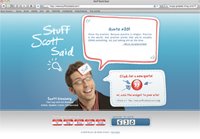
 Everyone is old to someone.
Everyone is old to someone.
Whether you’re fresh out of college, well into your career, a veteran office worker, a recently retired professional, or a grizzled old fart, there will always be people younger than you.
And if you want them to take you seriously, I have three words for you:
Just For Men.
Only kidding. Hair dye isn’t going to help you.
If you really want to be taken seriously by people half your age, you have to make a conscious decision to do so. Since I’ve already written on how to be taken seriously by people twice your age, here’s a list of ideas to help you on you way, Grandma: 1. If you’re not current – you’re not credible. The word “credibility” comes from the Latin creditum, which means, “Something loaned or entrusted to another.” Interesting. Credibility is on loan. Which means your credibility might take years to assemble, but only seconds to annihilate.
My suggestion is to stop reminiscing about how things used to be and start reveling in how things currently are. That’s the easiest way to invite someone to tune you out: By talking about the old days. Even if the old days were five years ago. Move on. Talk about the new days. What irrelevancies do you need to discard?
2. Learn the new tricks that matter. Fine. You’re an old dog. Big deal. The marketplace doesn’t care. If there’s a new trick that matters to your people, you still have to learn it.
For example, if you’re struggling with technology they’re familiar with, learn it. Take a class if you have to. Otherwise you’ll lose them. If you’re not up with current cultural trends, research it. Spend an hour on Wikipedia each week if you have to. Otherwise you’ll lose them.
Remember: The reason people aren’t taking you seriously has nothing to do with old age and everything to do with old thinking. Are the cobwebs in your brain marring your credibility?
3. Young people always rebel when they feel fundamentally disrespected. As such, avoid telling them you know what’s best for them. Avoid imposing your own direction on their lives. Avoid traveling roads for people they know they need to travel themselves.
And at all cost, avoid the phrase, “I told you so.”
All that does is cause people feel small and think, “I resent you so.” Instead, let people come to their own conclusions, make their own decisions and make their own mistakes.
Yes, it requires great emotional restraint. And yes, it requires significant self-control. But without such respectful delegation, you fractionize their experiences and rob them of valuable learning opportunities. Good luck being taken seriously after that.
Look: You can’t convince people to change – you can only give them more information. And sometimes the best way to help is to get the hell out of the way. What happened to the last person you tried to fix?
4. Don’t just get over yourself – stay over yourself. Not everyone who gets over himself remains in that position. Educate yourself in the language of humility. Learn to win less. Publicly share your mistakes. And be smart enough to be dumb.
Otherwise you kill your credibility with terminal certainty.
Also, consider getting down off your pedestal by offering it to others. Here’s how: When you share a success story, use someone younger as an example. When share tell a mistake moment, use yourself as an example. People of all generations will appreciate your honesty and be more willing to listen to you. Are you poking fun in the mirror?
5. Tune into their frequency. I once asked my fourteen-year-old cousin to email me the name of a particular video game he mentioned. His response: “Email? That takes forever!” I couldn’t believe my ears.
But it was a helpful lesson, because the bottom line was: People under eighteen don’t email. Ever. They communicate via text, instant message or social media. As such, before sending your next message, consider how people prefer to hear. Respond to the idiosyncratic needs of each person.
Otherwise, if you force everyone to conform to the your communication style, you run the risk of losing people who matter most.
Remember: And any number multiplied by zero is still zero. It’s not that they don’t like you – it’s that you’re not speaking on their frequency. Are you trying to reach people with outdated technology?
6. Magnifying the unhideable. There’s no need to dye the gray out of your hair. Instead, convert pigeonholes into goldmines. Consider the five most pervasive stereotypes young people have about your generation.
Next, ask yourself, “What do I bring that’s contrary to those judgments?” Then, use that unique value to disarm the immediate preoccupation in people’s mind. Let them know that despite your age – you’re different. Not that you’re in denial, but that you’re the exception to certain rules.
Ultimately, by putting your age on the table, you express honesty, humility and a healthy sense of humor. And those three attributes transcend age barriers every time. How could you express yourself instead of trying to prove yourself?
7. Enough trying to relate to people. You can’t manufacture commonality. And nothing annoys young people more than someone who pretends to be just like them. That’s the mistake older generations make:
They either go overboard trying to relate to young people and end up insulting their intelligence; or they ignore and disqualify anything that they don’t understand and alienate those people further.
Bad move. False relatability is the ultimate eye-roller. Just because you get a tattoo on your arm or mention Facebook doesn’t mean young people are going to take you seriously. Stop trying so hard.
What’s more, Millennials might actually take you seriously if you stopped calling them Millennials. All people, regardless of age, want to be called by their name – not their birthday. Do you see people as labels to be related to or individuals to be cared for and enjoyed?
REMEMBER: If you want younger generations to take you seriously, you don’t need hair dye, you don’t need Botox and you don’t need a new wardrobe.
What you need is a mental makeover.
Because the problem isn’t old age – it’s old thinking.
LET ME ASK YA THIS…
How many opportunities did you lose because people didn’t take you seriously?
LET ME SUGGEST THIS…
For the list called, “65 Things I Wish Somebody Would Have Told Me When I Started My Company,” send an email to me, and you win the list for free!
* * * *
Scott Ginsberg
That Guy with the Nametag
Author, Speaker, Entrepreneur, Mentor
scott@hellomynameisscott.com
 Who’s quoting YOU?
Who’s quoting YOU?
Check out Scott’s Online Quotation Database for a bite-sized education on branding success!
